I assumed to have a jsonb column header_format in my PostgreSQL table (which turns out to be type json[], really) .
A column value looks like this:
{"{\"label\":\"SUPPLIER\",\"name\":\"supplier_name\",\"value\":\"VNS LTD\",\"show\":true,\"showPrint\":true,\"map\":\"\",\"input_type\":\"text\",\"mapFrom\":\"header\",\"default\":true,\"note\":\"\"}","{\"label\":\"PRODUCT NAME\",\"name\":\"product_name\",\"value\":\"\",\"show\":true,\"showPrint\":true,\"input_type\":\"text\",\"map\":\"\",\"mapFrom\":\"header\",\"default\":true,\"note\":\"\"}","{\"label\":\"INVOICE / DC #\",\"name\":\"invoice_no\",\"value\":\"cs/12/1222\",\"show\":true,\"showPrint\":true,\"input_type\":\"text\",\"map\":\"\",\"mapFrom\":\"header\",\"default\":true,\"note\":\"\"}","{\"label\":\"INVOICE / DC DATE\",\"name\":\"invoice_date\",\"value\":\"2022-06-02\",\"show\":true,\"showPrint\":true,\"input_type\":\"text\",\"map\":\"DATE_EXT\",\"mapFrom\":\"header\",\"default\":true,\"note\":\"\"}","{\"label\":\"INVOICE QTY\",\"name\":\"invoice_qty\",\"value\":260,\"show\":true,\"showPrint\":true,\"input_type\":\"number\",\"map\":\"invoiceQty\",\"mapFrom\":\"header\",\"default\":true,\"note\":\"No Need to Map\"}","{\"label\":\"IR #\",\"name\":\"ir\",\"value\":\"FY-23-09-1\",\"show\":true,\"showPrint\":true,\"input_type\":\"text\",\"map\":\"\",\"mapFrom\":\"header\",\"default\":true,\"note\":\"\"}","{\"label\":\"GRN NO\",\"name\":\"grn_no\",\"value\":\"5032344565\",\"show\":true,\"showPrint\":true,\"input_type\":\"text\",\"map\":\"\",\"mapFrom\":\"header\",\"default\":true,\"note\":\"\"}","{\"label\":\"GRN DATE\",\"name\":\"grn_date\",\"value\":\"2022-06-02\",\"show\":true,\"showPrint\":true,\"input_type\":\"text\",\"map\":\"LAST_GR_DATE_EXT\",\"mapFrom\":\"header\",\"default\":true,\"note\":\"\"}","{\"label\":\"R/M CODE\",\"name\":\"rmcode\",\"value\":\"CR11803C00MAN\",\"show\":true,\"showPrint\":true,\"input_type\":\"text\",\"map\":\"\",\"mapFrom\":\"header\",\"default\":true,\"note\":\"\"}","{\"label\":\"EDS /Q /P #\",\"name\":\"eds\",\"value\":\"DE / EDS / 454\",\"show\":true,\"showPrint\":true,\"input_type\":\"text\",\"map\":\"eds\",\"mapFrom\":\"product\",\"default\":true,\"note\":\"\"}","{\"label\":\"DATE\",\"name\":\"date\",\"value\":\"2022-09-13\",\"show\":true,\"showPrint\":true,\"input_type\":\"date\",\"map\":\"\",\"mapFrom\":\"header\",\"default\":true,\"note\":\"\"}","{\"label\":\"R/M\",\"name\":\"rm\",\"value\":\"DC01+LC-MA-RL\",\"show\":true,\"showPrint\":true,\"input_type\":\"text\",\"map\":\"rm\",\"mapFrom\":\"product\",\"default\":true,\"note\":\"\"}","{\"label\":\"RECEIVED QTY\",\"name\":\"received_qty\",\"value\":260,\"show\":true,\"showPrint\":true,\"input_type\":\"number\",\"map\":\"invoiceQty\",\"mapFrom\":\"header\",\"default\":true,\"note\":\"No Need to Map\"}","{\"label\":\"SHELF LIFE\",\"name\":\"shelf_life\",\"value\":\"20.11.2022\",\"show\":true,\"showPrint\":true,\"input_type\":\"text\",\"map\":\"Shelf Life\",\"mapFrom\":\"header\",\"default\":true,\"note\":\"No Need to Map\"}","{\"label\":\"MATERIAL TEXT\",\"name\":\"material_text\",\"value\":\"CP7B-DC01,1.18 x 31.5\",\"show\":true,\"showPrint\":true,\"input_type\":\"text\",\"map\":\"MATTEXT\",\"mapFrom\":\"header\",\"default\":true,\"note\":\"\"}"}
I am inserting format in header_format column:
[{
label:'1',
value:'abc',
other...
},
{
label:'2',
value:'aab',
other...
}]
I want a list of rows when it matches "{label:'supplier'}" in array datatype.
I tried the following methods:
Method 1:
Database.rawQuery('select * from qasformones where header_format @> "{label:supplier}"')
Method 2:
Database.rawQuery('select * from qasformones where header_format @> "[{label:supplier}]"')
I got the following error:
column "{label:supplier}" does not exist
select * from qasformones where header_format @> "{label:supplier}" - column "{show:true}" does not exist
How to do this query?
